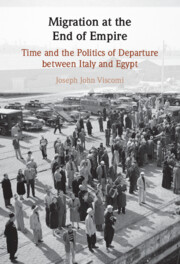Book contents
- Migration at the End of Empire
- Migration at the End of Empire
- Copyright page
- Contents
- Figures
- Tables
- Acknowledgements
- Introduction
- 1 Extraterritoriality and Migrant Diplomacy in Egypt, 1861–1937
- 2 Isolating Time
- 3 Twice without a King
- 4 Becoming Refugees, 1954–1960s
- 5 ‘Leave Us Our Memories!’ Nostalgia, Community, and the Politics of Departure
- Epilogue
- Bibliography
- Index
2 - Isolating Time
Civilian Internment during the Second World War
Published online by Cambridge University Press: 30 May 2024
- Migration at the End of Empire
- Migration at the End of Empire
- Copyright page
- Contents
- Figures
- Tables
- Acknowledgements
- Introduction
- 1 Extraterritoriality and Migrant Diplomacy in Egypt, 1861–1937
- 2 Isolating Time
- 3 Twice without a King
- 4 Becoming Refugees, 1954–1960s
- 5 ‘Leave Us Our Memories!’ Nostalgia, Community, and the Politics of Departure
- Epilogue
- Bibliography
- Index
Summary
This chapter examines how a shared experience of isolation during the Second World War clouded a sense of the future for civilian internees. It focuses on how various historical processes collapsed into the spacetime of confinement for most working-age Italian men in Egypt. British authorities had planned a complete shutdown of the Italian community during Italy’s 1935 Ethiopia campaign, when they perceived the large-scale participation in fascist institutions as a ’fifth column’ threat to their authority in Egypt. After June 1940, Anglo-Egyptian authorities closed Italian institutions, froze bank accounts, restricted movement, and forbade the signing of contracts with Italian nationals. Italian institutional life, which had become central to the population during the after 1919 was abruptly brought to a halt. While the buttressing of the Italian population collapsed during the war, many of its political structures remained intact. In this chapter, the camp is seen as a temporal isolation chamber, one that delimited the horizons of the internees during the war and then moulded a shared experience that would inform their relationship with the post-fascist Italian state after the war.
- Type
- Chapter
- Information
- Migration at the End of EmpireTime and the Politics of Departure Between Italy and Egypt, pp. 83 - 130Publisher: Cambridge University PressPrint publication year: 2024

